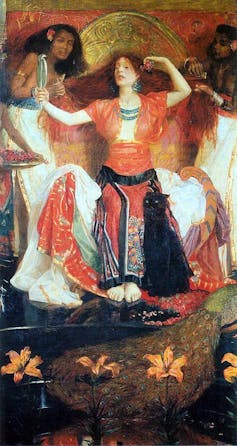In the smash-hit TV adaptation of Margaret Atwood’s The Handmaid’s Tale, episode eight, “Jezebel’s”, draws on the memory of a biblical queen from the Old Testament. Like Delilah and Eve, Jezebel, too, is a biblical female remembered unfairly as sexually immoral. Years of slander have led to the name Jezebel becoming cultural shorthand denoting a woman of wanton sexuality and promiscuity – when in fact she was a powerful queen and loyal wife.
The episode “Jezebel’s” features a men’s sex club by the same name. Here, the women are scantily clad in bright, glittering clothes – and are expected to fulfil any wish or desire of the powerful men visiting them. Offred, the lead character, sees her best friend from before the dystopia of Gilead began and when she was known by her real name of June. Her friend notes that she looks like “a whore of Babylon” – thus linking the memory of Jezebel with sexual immorality using biblical language.
Sin and sexuality are explicit in this episode through the women being enslaved as prostitutes at the club, as well as June being raped there. The sex club, full of “fallen women”, highlights the episode’s themes of debauchery – characterised by the name: Jezebel.
The biblical Jezebel’s cultural afterlives take numerous forms throughout popular culture and have perpetuated her defamation. Thesaurus.com gives “hussy,” “harlot” and “slut,” as synonyms for “Jezebel”.
Jezebel has been re-appropriated by various films and series, as well as by online news pages with the common theme of sex and celebrities. For example, the website Jezebel reports on “celebrity, sex, [and] fashion for women”, with articles on sex toys and sex icons. Jezebel’s name represents decadence and indulgence, sexuality, and celebrity secrets – all those things we shouldn’t be interested in (but are).
Jezebel is also the name of a lingerie brand being sold by HerRoom, again making explicit the links between Jezebel and sex, female sexuality, and sexual enticement.
Jezebel as a ‘whore’
While this understanding of Jezebel does come from the biblical text, it is not a true reading of her character. In the Old Testament there is a theme of “whoring” as a person being associated with foreign religions. This is due to the religious relationship between the people and God being understood in the Bible as a “marriage” contract. Worshipping anyone other than the Israelite God, then, was seen as adultery and discussed using sexual language suited to adultery and extra-marital relations.
Jezebel is an Israelite queen who was born in Sidon (modern day Lebanon). She is portrayed as being influential in both legal and religious matters – and as an extremely loyal wife. The fact that the name of Jezebel has become synonymous with promiscuity and wickedness is misleading as the biblical narrative gives us no reason to suspect her of sexual immorality.

Actually, accounts of Jezebel in the Bible invoke the image of a devoted wife. In the first Book of King’s she puts up with her husband, Ahab’s sour moods and uses any method at her disposal to give him the things he wants. In the second book of Kings, a contender for the throne of Israel says to Joram: “What peace can there be, so long as the many whoredoms and sorceries of your mother Jezebel continue?” What is important to note, is that this reference to whoredom, by Jezebel’s rival, is not a sexual reference but a religious one.
Marriage is used as a religious metaphor throughout the Bible with worship of the Israelite God rendering God as the “husband” and Israel the “wife”. Therefore, since Jezebel does not worship the Israelite God – and she is converting Israelites to her foreign religion, she is understood, in terms of this marriage metaphor, to be an adulterer.
As biblical scholar Tina Pippin noted in her feminist re-imagining of Kings, for the Israelite author: “Whoring and fornication is associated with strange religion and strange culture.”

Adultery or “whoredom” to represent Israelites worshipping idols and foreign gods is common. This link between foreign worship and “whoredom” shows that Jehu’s accusation is a metaphor for her being an idolater – or worshipper of “false” gods.
Jezebel applies make up. For the patriarchal author of the books of Kings, her beautifying regime is a seduction technique and preparation to make love. After all, as biblical scholar Judith McKinlay noted in 2002: “Israelite writers ‘knew’ that women have a natural inclination for promiscuity.”
And so thanks to the classical biblical metaphor which regards the relationship between Israel and God as a marriage, Jezebel – with her “foreign” beliefs has been tarred as an adulteress. That she is also described as putting on make-up and beautifying herself has led her to be remembered, unfairly as sexually immoral. The powerful queen, ambitious princess and loyal wife is lost to history.

